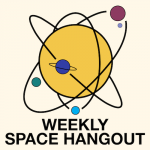Podcaster: Host : Fraser Cain ; Guest: Dr. Ralph McNutt, Dr. Moiya McTier, Allen Versfeld, Veranika (Nika) Klimovich

Title: Weekly Space Hangout – Dr. Ralph McNutt, PI for the Proposed Interstellar Probe Mission
Link: Cosmoquest: http://cosmoquest.org
Description:
Today’s story:
- Very large number of stellar-mass black holes.
- What it’s like to apply to be an astronaut.
- JWST, obviously…
- A crazy new image of the heart of the MW!
Host: Fraser Cain ( @fcain )
Special Guest: This week we are excited to welcome Dr. Ralph McNutt to the WSH. Two weeks ago, Dave Dickinson introduced us to a proposed new mission by the Johns Hopkins University Applied Physics Laboratory, the Interstellar Probe (https://interstellarprobe.jhuapl.edu/). Ralph is the Principal Investigator for this exciting new mission and he is here tonight to tell us more about it.
Dr. Ralph McNutt is the chief scientist in the Space Department at the Johns Hopkins University Applied Physics Laboratory, which he joined in 1992. As project scientist for the MESSENGER mission, he serves as the principal investigator’s “right-hand man” in making sure that the spacecraft, mission design and experiment plan answer all six of the major science questions the project will investigate at the innermost planet. He will participate in analysis of Mercury’s surface composition using data from MESSENGER’s X-Ray Spectrometer and Gamma-Ray and Neutron Spectrometer instruments.
Ralph is also a co-investigator on NASA’s New Horizons (Pluto-Kuiper Belt) mission, a team member of the Cassini Ion Neutral Mass Spectrometer investigation and a science team member of two Voyager investigations. He has been involved in a range of space physics research projects and mission studies, including studies of the magnetospheres of the outer planets, the interaction of the solar wind with the interstellar medium, solar neutrinos, and solar probe and interstellar probe missions for the future.
He has held various NASA grants and served on various NASA review and planning panels and Science and Technology Definition Teams for Solar Probe (twice) and Interstellar Probe. He has published over 150 science and engineering papers and over 250 scientific and engineering abstracts and given over 150 professional and popular talks.
Ralph received his bachelor’s of science degree in physics at Texas A&M University in 1975 and his doctorate in physics at the Massachusetts Institute of Technology in 1980. He has been at APL since 1992 and before that held positions at Visidyne, Inc., MIT, and Sandia National Laboratories in Albuquerque.
You can learn more about the Interstellar Probe Mission on their website (https://interstellarprobe.jhuapl.edu/) or by reading the Interstellar Probe Study 2019 Report (https://interstellarprobe.jhuapl.edu/uploadedDocs/papers/588-ISP-Study-2019-Report_PR.pdf)
Regular Guests:
- Dr. Moiya McTier ( https://www.moiyamctier.com/ & @GoAstroMo )
- Allen Versfeld ( http://www.urban-astronomer.com & @uastronomer )
- Veranika (Nika) Klimovich ( @veranikaspace & Pictame: @nika_klim )
Today’s sponsor: Big thanks to our Patreon supporters this month: Rob Leeson, David Bowes, Ron Diehl, Brett Duane, Benett Bolek, Mary Ann, Frank Frankovic, Michael Freedman, Kim Hay, Steven Emert, Frank Tippin, Rani Bush, Jako Danar, Joseph J. Biernat, Nik Whitehead, Semyon Torfason, Michael W, Cherry Wood, Steve Nerlich, Steven Kluth, James K Wood, Katrina Ince, Phyllis Foster, Don Swartwout, Barbara Geier, Steven Jansen
Please consider sponsoring a day or two. Just click on the “Donate” button on the lower left side of this webpage, or contact us at signup@365daysofastronomy.org.
Or please visit our Patreon page: https://www.patreon.com/365DaysOfAstronomy
End of podcast:
365 Days of Astronomy
=====================
The 365 Days of Astronomy Podcast is produced by Planetary Science Institute. Audio post-production by Richard Drumm. Bandwidth donated by libsyn.com and wizzard media. You may reproduce and distribute this audio for non-commercial purposes.
This show is made possible thanks to the generous donations of people like you! Please consider supporting to our show on Patreon.com/365DaysofAstronomy and get access to bonus content.
After 10 years, the 365 Days of Astronomy podcast is poised to enter its second decade of sharing important milestone in space exploration and astronomy discoveries. Join us and share your story. Until tomorrow! Goodbye!

